Scottish election 2021: Five things we learned from the first debate
- Published
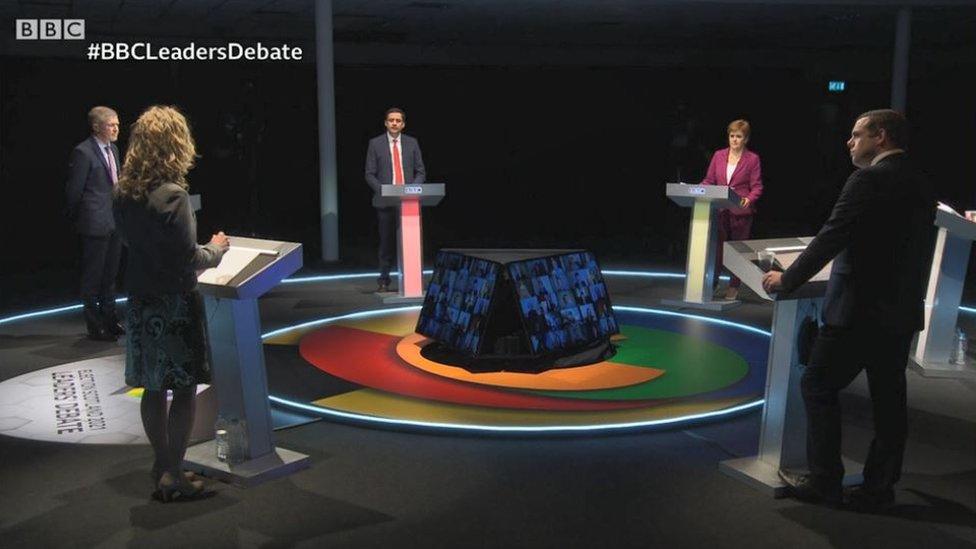
Leaders of the five largest parties took part in the BBC debate
Scotland's political leaders have clashed in the first TV debate of the Holyrood election campaign. What did it tell us about how the contest is shaping up and how parties are pitching themselves to voters?

1. Politeness on the surface but divisions run deep
The Scottish Parliament term ended in a blaze of bad temper, with votes of no confidence and personal attacks flying thick and fast.
So this debate was a chance to see if the temperature would come down as parties hit the campaign trail - or escalate still further.
The leaders all called each other by their first names throughout, and with the audience dialling in from home sought not to shout over each other in the hush of a largely deserted studio - at least to start with.
But ultimately there are deep divisions between these politicians. And they showed.
2. Nicola Sturgeon wants to contrast her leadership with Boris Johnson - not Alex Salmond
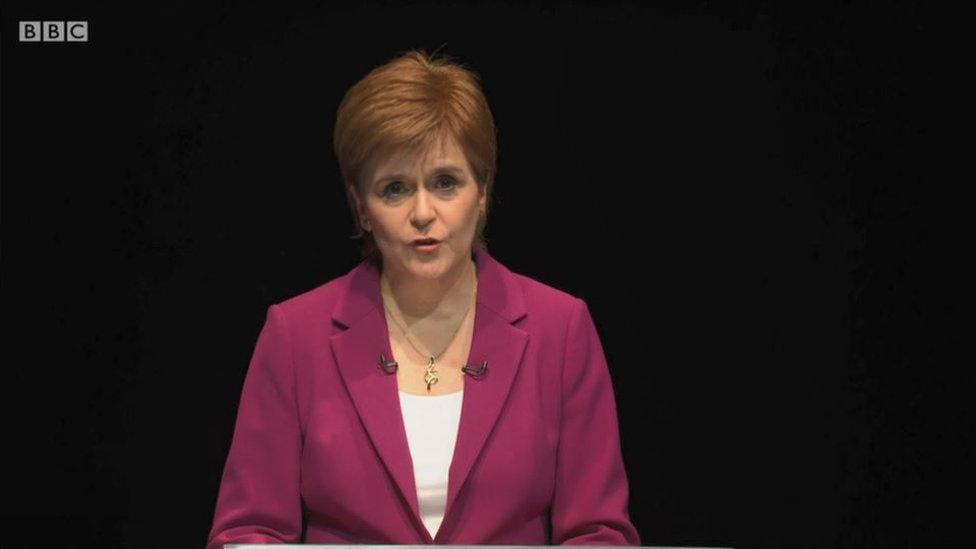
Nicola Sturgeon sought to major on pandemic leadership and her vision of independence
It is still early days in the election campaign, but already the shapes of the platforms parties are building are becoming clear.
SNP leader and First Minister Nicola Sturgeon leaned on her pandemic leadership and the promise of a fresh choice on Scotland's future for the electorate - with a heavy caveat that any vote would come after the health crisis has passed.
As in her campaign conference speech on Monday, Ms Sturgeon chose to single out her dream opponent in this debate - the prime minister.
On independence, her pitch is straightforward - who would you rather have in charge, me or Boris Johnson?
But it was another politician, not actually in the room, who was cited by Ms Sturgeon's opponents - Alex Salmond and his new Alba Party.
His intervention complicates the independence issue for Ms Sturgeon, in that he and his party present a different vision of her core policy and even different ways of achieving it - opening up all kinds of detailed, difficult questions that the SNP leader would rather keep for another day and campaign.
But ultimately the former first minister was not the ghost at the feast in this event - the leaders present managed to drag the debate back to independence time and again all on their own.
Somehow, even what looked set to be a heart-warming segment at the end where all the leaders agreed to call out abusive language in political discourse ended with a row about the constitution.
3. The Conservatives want to talk independence - Labour want to move on
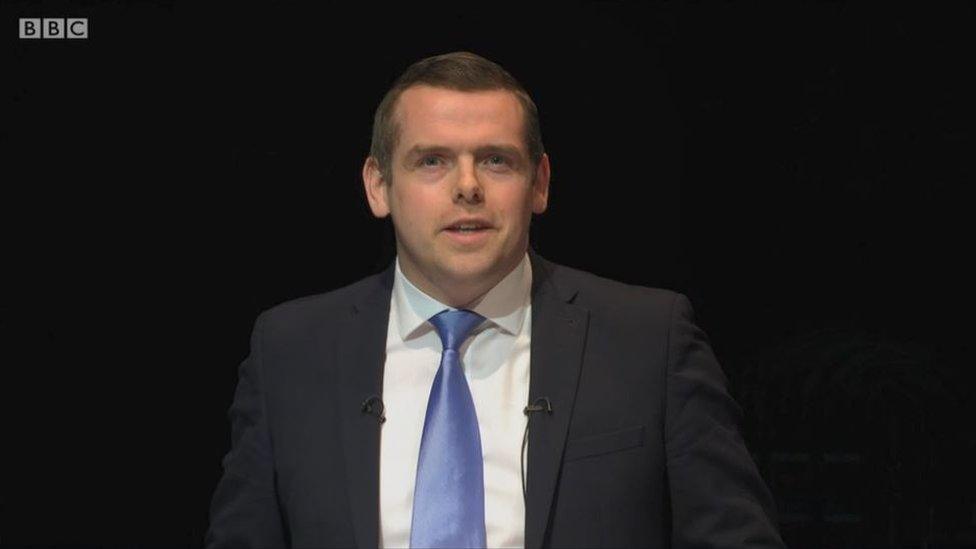
Douglas Ross brought the debate back to the constitution - safe territory for his Conservatives
Conservative leader Douglas Ross sought to galvanise his base by going back to the well of "no referendum" repeatedly. He mainly sought out clashes with Ms Sturgeon, given his party's goal is to deprive her party of a majority and provide "strong opposition" at Holyrood.
He may have actually overdone it somewhat when he said he wouldn't even work with the SNP to tackle climate change, such are their constitutional disagreements.
And independence was also his weapon of choice when attacking Anas Sarwar, seeking to tempt any hardcore unionists in the Labour ranks into backing his party instead.
Mr Sarwar, recently elected the leader of a party which has lost its position atop Scottish politics along with much of its traditional support to the SNP over recent years, has a more difficult tightrope to walk.
The primacy of the constitutional debate has left Labour looking rather shut out in campaigns since the 2014 referendum, with the SNP corralling pro-independence voters and the Conservatives cloaking themselves in the Union flag.
But the pandemic - along with Mr Sarwar's extremely-new-broom leadership - has added a fresh edge to their cry of "wouldn't you rather talk about something else?"
Thus he sought to appear the reasonable alternative to both parties at every turn. If Labour has bled votes to both ends of the constitutional spectrum in the past, Mr Sarwar hopes to win them back from both ends now too.
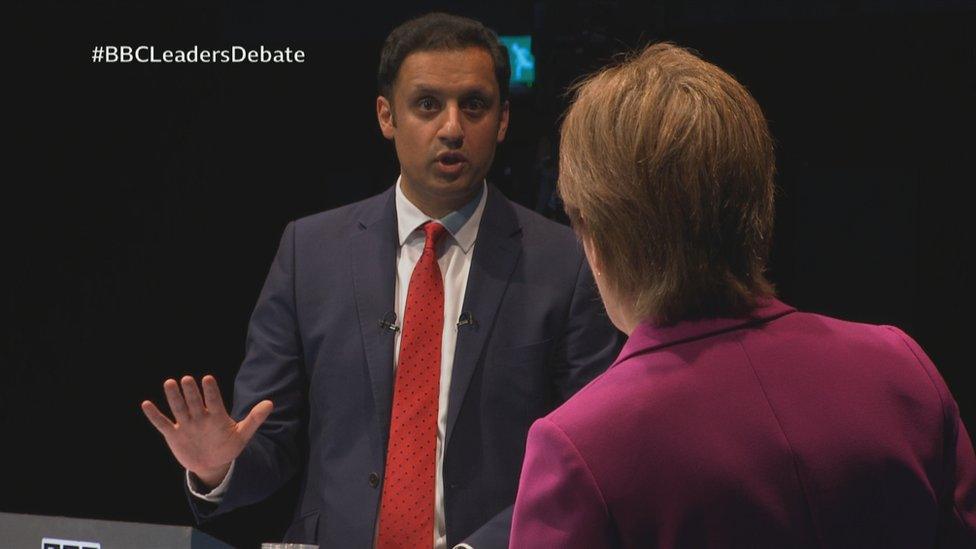
Anas Sarwar faces a challenge in bringing Labour back from third place at Holyrood
4. The Greens and Lib Dems have to be different
Green co-leader Lorna Slater also had a tricky balancing act to perform, in her first appearance in a TV debate.
With the Alba Party providing extra competition for pro-independence votes, the Greens need to underline their credentials on that front - and she did so with another attack on the Westminster government.
However, they also need to differentiate themselves from the SNP, to give that party's supporters a reason to not just back them on both ballot papers. In the year the COP26 climate summit comes to Glasgow, the environment is as solid an electoral hook as anyone could wish for, and it's home turf for the Greens.
Meanwhile, Lib Dem leader Willie Rennie was one of the more experienced campaigners on the stage, and he harked back to previous campaigns by stressing that he didn't want to repeat them.
The Lib Dems have long traded off their pro-European image, and Mr Rennie used that to prop up his other constitutional argument by saying a new independence vote would be a re-run of Brexit.
In trademark Rennie style he also provided one of the few laughs of the evening when he was caught on camera waving back at audience members who were saying goodbye at the end of the programme.
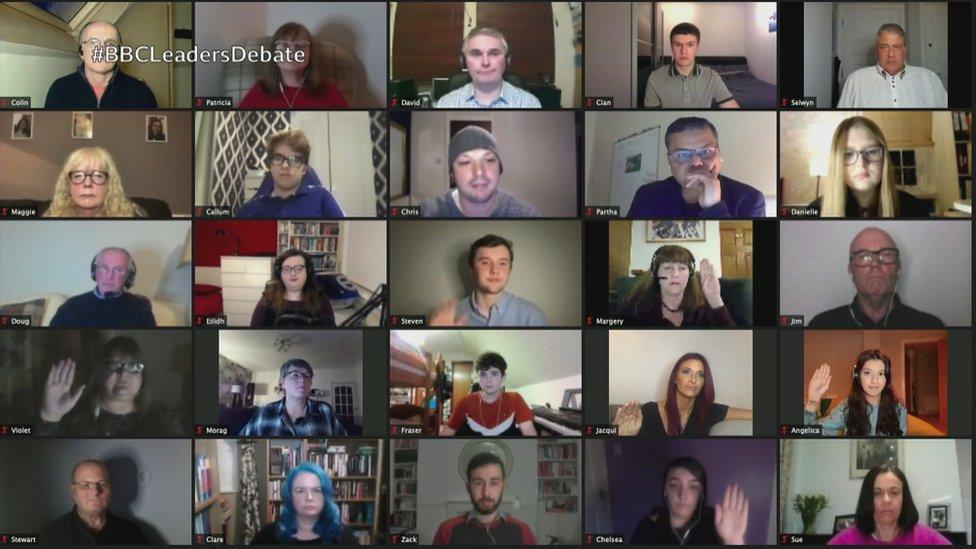
The debate had a virtual audience rather than one in the studio - but they still made their presence felt
5. This is just the beginning...
This was an early-election contest, with parties happy for a chance to set the tone for the weeks ahead - but mostly seeking to avoid any serious gaffes.
In fact it's so early in the campaign that nobody has published a manifesto yet.
None of the leaders opted to use the debate to launch a shiny new policy, so ultimately they either had to stick to predictable, well-trodden ground, or drop some hints.
Nicola Sturgeon let slip that there might be something to come in the SNP manifesto about the universal basic income, an idea the party has backed trials of in the past.
But somehow the biggest row about a specific manifesto promise was one dating back to 2007 - the SNP's pledge to scrap the council tax, which sparked yet another confrontation between Mr Ross and Ms Sturgeon.
In the weeks ahead, more policy pledges and details should be forthcoming - providing plenty of fodder for the debates to come.

POLICIES: Who should I vote for?
PODLITICAL: Updates from the campaign
